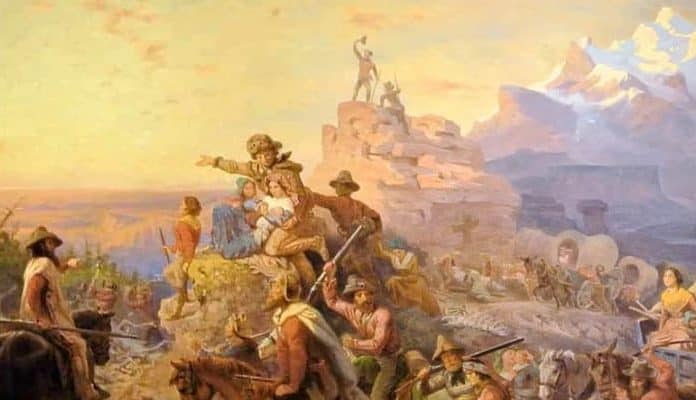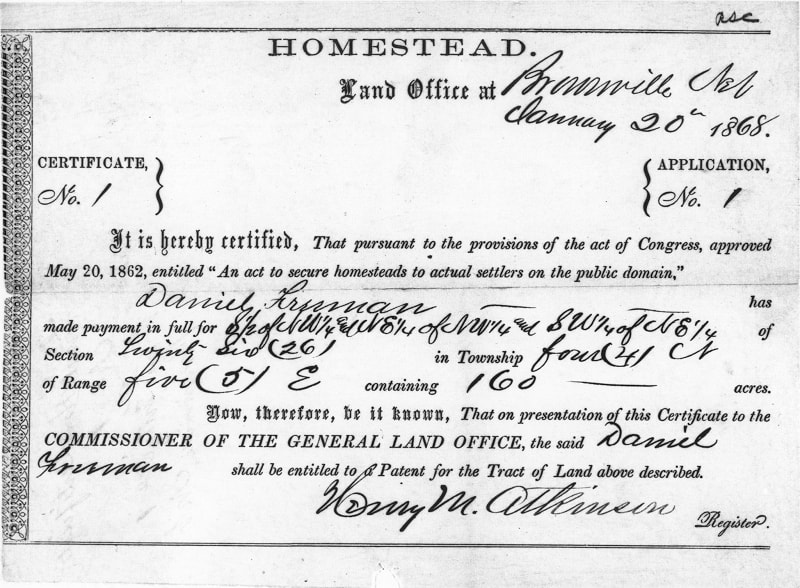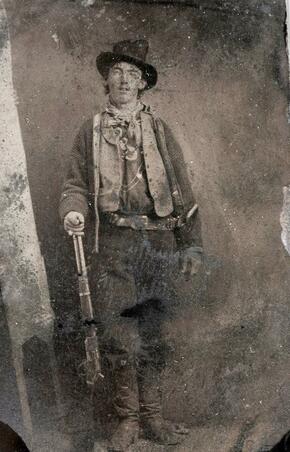...THAT THE ‘WILD WEST’ ONLY LASTED FOR 30 YEARS. “Thus the advance of the frontier has meant a steady movement away from the influence of Europe, a steady growth of independence on American lines.” ― Frederick Jackson Turner, The Frontier in American History In his 2001 book, The American West: The Invention of a Myth, David Murdoch asserts that America is ‘exceptional’ inasmuch as it is the only country to have chosen its own self-image: "No other nation has taken a time and place from its past and produced a construct of the imagination equal to America's creation of the West". The ‘selection’ of a particular place and time in history to use in the assembly of a symbolic self-image, if true, is a remarkable piece of history-making. The ‘Wild West’, or the ‘Old West’, is so dense with historical imagery and meaning that a single mention of either of these two terms immediately conjures in the mind, gunslingers, sheriffs, wagon trails, gold rushes, saloons, western expansion, the frontier, Davy Crockett, grit and American determination, among countless other imaginings. But did you know that this foundational imagery (imagined or otherwise) is rooted in a period of only thirty years after the American Civil War? That’s 1865 to 1895. Although westward expansion into the interior of the North American continent began in earnest with President Thomas Jefferson’s Louisiana Purchase in 1803 - for roughly $15 million in today’s money - the period of time upon which many Americans model their historical character came after the Civil War (1861-1865). More specifically, the ‘Wild West’ comes after Abraham Lincoln signed into law the Homestead Act of 1862. This act, along with subsequent laws, essentially opened up what amounted to roughly 10% of the total area of the contiguous United States to anyone who had not taken up arms against the Federal Government. For free. 160 million square acres west of the Mississippi River were given to 1.6 million homesteaders who promised to build on and improve the land they were given - which was usually around 160 acres. Certificate of the first homestead according to the Homestead Act. Given to Daniel Freeman in Beatrice, Nebraska 1963 (Source: http://www.archives.gov/education/lessons/homestead-act/images/homestead-certificate.jpg |Date= 1868) Regardless of the reasons for the giving away of free land (perhaps a discussion for another blog post), give it away the Federal Government did. And people rushed westward to stake their claim. Millions of them. It is during this period of dynamic western movement and land-claiming (‘land rushes’ were more frequent than ‘gold rushes’) that the imagery of the ‘Wild West’ - historically accurate or otherwise - is forged. From gunslingers like Billy ‘the Kid’ and Jesse James, to the ‘lawless’ frontier towns with saloons, gambling dens, brothels and noble sheriffs such as Wyatt Earp, as well as the ‘taming’ of the American land through hard work and bloody conflict (Wounded Knee was in 1890), the symbolism of the American West was very much created in this period. William H. Bonney A.K.A. Billy 'the Kid' Although westward expansion, as a concept, ended in 1912 with the admittance of Arizona to the US as a contiguous land mass, according to Frederick Jackson Turner, the ‘frontier life’ that had so completely shaped the character of America, was at an end long before then: "...the frontier has gone, and with its going has closed the first period of American history." Frederick Jackson Turner, The Significance of the Frontier in American History Turner wrote this in 1893. In those three brief decades after the Civil War, the mythology of the ‘Wild West’ - that which is embedded so deeply in American popular and historical culture - was born. Westward Expansion in a GIF. Source: Vivid Maps Elliott L. Watson
@thelibrarian6
4 Comments
Samantha Roberts
26/3/2019 23:34:37
I think it is fairly irresponsible to not note that the 1.6 million homesteaders who benefited from this free land grab were white. The same privelege wasn't given to the recently "freed" black slaves or the indigenous people who had occupied the land prior. This is an important factor when looking at the long history of poverty and inequality of this country.
Reply
Samantha Roberts
27/3/2019 21:03:17
Because this piece props up harmful narratives based on the violent erasure of indigenous people and the exploitation of minority groups. To discuss the mythos of the American West and fail to mention this is alarming and disingenuous, and is absolutely within the scope of this piece.
Reply
DJ
27/3/2019 17:42:48
Very interesting! Thank you for this post. I'm not sure why people are getting upset over something outside the scope of this piece.
Reply
Leave a Reply. |
Categories
All
Archives
April 2024
|




 RSS Feed
RSS Feed